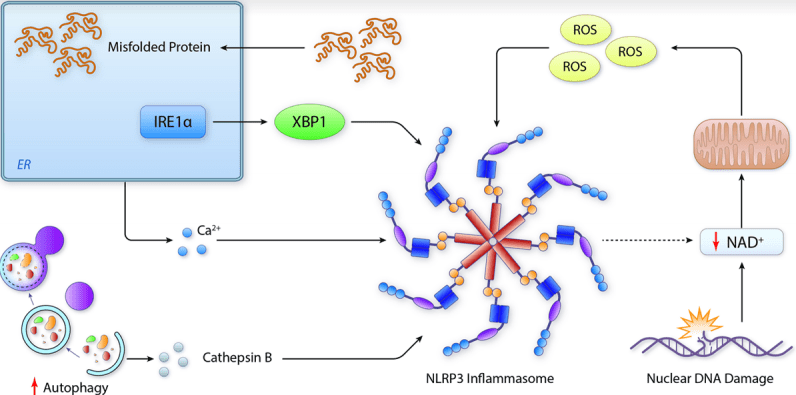Trial: Using Vitamin B3 To Treat Atrial Fibrillation in Heart Failure Patients
The prevalence of atrial fibrillation (AF) in patients with heart failure (HF) is associated with an extra increase in risk for stroke development, number of hospitalisations and mortality. Given the high prevalence of AF in patients with HF, there is an unmet need for therapies that reduce AF episodes based on underlying mechanisms.
Recent research findings show that AF is associated with a reduction in the levels of the vitamin B3 metabolite nicotinamide adenine dinucleotide (NAD+). NAD+ is mainly present in the mitochondria and drives energy production of the cell. In case of reduced NAD+ levels, the mitochondria produce oxidative stress, which it toxic for the cells. Oxidative stress results in DNA damage and consequently cardiomyocyte impairment. Therefore, supplementation of the NAD+ pool may have beneficial effects in clinical AF.
Lisa Pool, PhD candidate in the research team of Brundel (Amsterdam UMC) and De Groot (Erasmus Medical Center) is working on a clinical trial to increase the NAD+ levels in atrial tissue in the hope to attenuate AF in HF patients.
Nicotinamide Riboside: a nutraceutical for the treatment of atrial fibrillation
Various experimental studies elucidate that the dietary supplement nicotinamide riboside, the precursor of NAD+, attenuates oxidative (mitochondrial) DNA damage. As a consequence, cardiac function improved in model systems for HF and AF. Also, nicotinamide normalises blood-based mitochondrial function markers and energy metabolites of the NAD metabolome (e.g. NAD+/NADH), suggesting that this nutraceutical results in an overall improved energetic balance of heart and body.
HF-AF ENERGY trial
The HF-AF ENERGY trial is the first clinical trial that includes patients who suffer from both HF and AF with the aim to examine the cardioprotective impact of dietary supplementation with nicotinamide riboside on the AF burden. Also, within this trial blood-based mitochondrial function markers and energy metabolism is determined. This study addresses a gap in our current knowledge on the clinical proof-of-concept for the NAD pathway as a druggable target in AF.
Study objective of the HF-AF ENERGY trial
To aim of the study is:
- To investigate whether the NAD+ precursor nicotinamide riboside normalizes blood-based mitochondrial function markers and energy metabolites of the NAD metabolome
- To examine whether nicotinamide riboside reduces the burden of AF episodes in HF patients
Study population
The HF-AF ENERGY trial included 20 patients (aged between 18-90 years) with HF and diagnosed with paroxysmal or persistent AF and equipped with an implantable cardiac defibrillator (ICD).
Study design
The study consists of two phases: four months pre-observation and four months intervention phase (Figure 1).
Start study (baseline visit) and pre-observation phase: At baseline, the AF burden is determined by continuous atrial rhythm monitoring by utilizing the ICD. Baseline levels of energy metabolites and mitochondrial function markers are derived from blood samples. An echocardiographic examination is performed to asses cardiac function.
Intervention period: after a 4 months observaton phase, patients start taking the nicotinamide riboside supplements (250 mg/capsule, Niagen® Chromadex) for a period of 4 months. The initial dose is one capsule twice daily, followed by weekly up-titration by one capsule/dose to a maximal dose of 4 capsules twice daily (2000 mg daily). This dose is continued till final visit in week 16.
End study (final visit): at the final visit, patients undergo the same assessments as performed at the baseline visit. The pre- and post-treatment outcomes are compared to determine whether nicotinamide riboside supplementation reduces the AF burden and blood-based mitochondrial function markers and energy metabolism.

Figure 1. Overview of the HF-AF ENERGY trial. The study consists of two phases: four months pre-observation and four months intervention phase with the nutraceutical nicotinamide riboside (NR). Study endpoints include AF burden and blood-based mitochondrial function markers and energy metabolism (figure adapted from the HF-AF Energy trial)
Outlook of the HF-AF ENERGY trial
The HF-AF ENERGY trial investigates whether nicotinamide riboside treatment attenuates the atrial fibrillation burden, improves mitochondrial function markers and energy metabolism in heart failure patients with atrial fibrillation.
Targeting energy metabolism by increasing NAD+ levels with the nutraceutical nicotinamide riboside may represent a promising therapy for these patients.
Do you want to read more about the HF-AF ENERGY trial? See our publication at: https://link.springer.com/article/10.1007/s10557-022-07382-4
AFIP wishes Lisa Pool, Agnes Muskens, and all researchers and participating patients, all the best with this clinical trial.
Do you know someone who might be interested in this?






